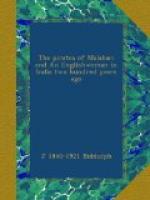were refused any extra allowance, which caused much
discontent. Before long the Directors became alarmed
at the defenceless state of Bombay, and sent out Keigwin
again with troops and artillery, to have the chief
military command and the third seat in Council.
To meet the expense, the other officers were made
to suffer in rank and pay, and the whole of the small
force fell into a dangerous state of discontent.
Among other reductions in the pay of their military
force, the Directors reduced the rate of exchange,
a measure that affected the men as well as the officers;
and, not content with making these changes prospective,
insisted that the officers should refund the surplus
of what they had received. Keigwin also had his
personal grievance. He claimed subsistence money,
like the rest of the merchants and factors, the Company’s
table having been abolished.[4] After much altercation,
a grant was made to him, on the condition that it
would have to be refunded if disallowed by the Directors.
He was sick of the Company, with their greed and their
selfish economies at the expense of their servants,
their broken pledges and stupid changes of policy
in military affairs, the intrigues of Sir John Child
at Surat, and the schemes of his brother, Sir Josiah
Child, in England. Like many other Englishmen,
he considered the Company was an anomaly, dangerous
to the authority of the Crown, and his distrust was
increased by the mismanagement and corruption that
existed among their servants in the East.
On the 27th December, 1683, he seized Mr. Ward, the
Deputy Governor, and such of the Council as sided
with him, assembled the troops, and issued a proclamation
declaring the Company’s authority at an end,
and that the island was henceforth under the King’s
protection. By general consent he was elected
Governor, and at once proceeded to restore order.
The troops and inhabitants were called on to take
an oath of allegiance to the King, and to renounce
their obedience to the Company, a demand that was
universally complied with. Officials were appointed,
grievances were redressed, and trade was encouraged,
to be carried on without molestation so long as Keigwin’s
authority was not challenged. Money arriving from
England was lodged in the fort, with a declaration
that it would be employed only in defence of the island,
and letters were addressed by Keigwin to the King
and the Duke of York, stating his determination to
hold the island for the King till his Majesty’s
pleasure should be known, together with the causes
that had led to the revolt; one of them being the
necessity of preserving it from becoming a conquest
to the native powers.




